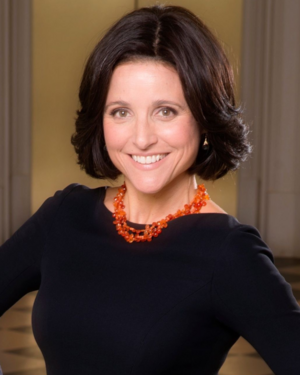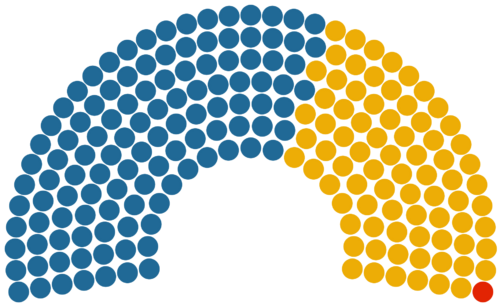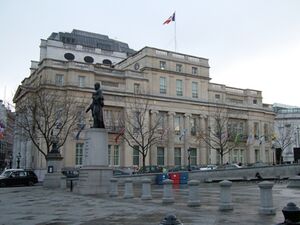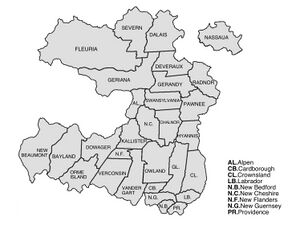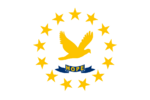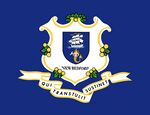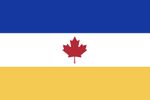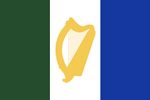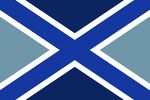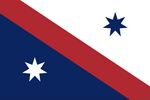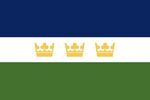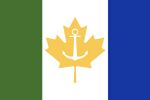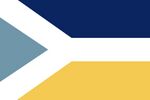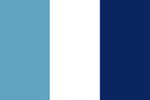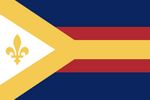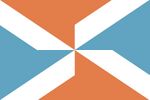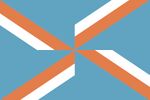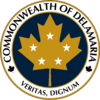Delamaria: Difference between revisions
| Line 214: | Line 214: | ||
|- | |- | ||
| bgcolor=#1d6996|'''{{white|#1d6996}} | | bgcolor=#1d6996|'''{{white|#1d6996}} | ||
| '''United Party of Delamaria | | '''[[United Party of Delamaria]] | ||
| Uniteds | | Uniteds | ||
| Conservative centre-right | | Conservative centre-right | ||
| Line 221: | Line 221: | ||
|- | |- | ||
| bgcolor=#edad08|'''#edad08 | | bgcolor=#edad08|'''#edad08 | ||
| '''Liberal Party of Delamaria | | '''[[Liberal Party of Delamaria]] | ||
| Liberals | | Liberals | ||
| Liberalism Centre | | Liberalism Centre | ||
| Line 228: | Line 228: | ||
|- | |- | ||
| bgcolor=#e22400|'''{{White|#e22400}} | | bgcolor=#e22400|'''{{White|#e22400}} | ||
| '''Unionist Party of Delamaria | | '''[[Unionist Party of Delamaria]] | ||
| Unionists | | Unionists | ||
| Socialism, Communism | | Socialism, Communism | ||
Revision as of 14:57, 21 July 2021
Commonwealth of Delamaria | |
|---|---|
| Motto: Veritas, Deignitas Truth and Dignity | |
| Anthem: Ode to Delamaria | |
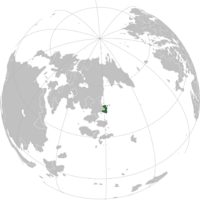 | |
| Capital | Labrador |
| Largest | Yorkerdam |
| Official languages | Anglish Lysian Variot |
| Recognised national languages | Brux |
| Recognised regional languages | Idahan, Wiscan, Jonjava |
| Ethnic groups (2020) | 87% Western Europan, 4% Afropan Delamarian, 2.6% Native Delamarian |
| Religion (2020) |
|
| Demonym(s) |
|
| Government | Federal Semi-Presidential Commonwealth |
| Deborah Van Roose | |
| William Patton | |
| Angelina Hudson | |
• Speaker of the House | Edward Kingsland |
| Legislature | Commonwealth Congress |
| Senate | |
| House of Delegates | |
| Independant Colonies unified in 1825 | |
• Formation of the Four Colonies | 1640-1702 |
• Colonies Gain Independence | 1798 |
• Treaty of Yorkerdam | 1801 |
• Confederation | 1819 |
• Treaty and Constitutional conference of Alberta | 1825 |
• Annexation of Nassaua | 1852 |
| Area | |
• | 135,000 km2 (52,000 sq mi) |
| Population | |
• 2018 estimate | 40,170,000 |
• Density | 297/km2 (769.2/sq mi) |
| GDP (nominal) | 2021 estimate |
• Total | 1,211,000,000,000 (10th) |
• Per capita | 32,110 (18th) |
| Gini (2021) | 55.9 high |
| HDI (2018) | 0.82 very high |
| Currency | Labrador Franc (LRF) |
| Time zone | UTC +00:00 |
| Date format | dd/mm/yyyy AD |
| Driving side | right |
| Calling code | +11 |
Delamaria, officially the Commonwealth of Delamaria (Lysian:Communauté de Delamaria), is a country located in Argis on Eurth, its neighbours Fravina to the north west, Stedoria to the west, Dolchland to the south, and the Adlantic Ocean to the East. Made up of 40.1 Million Delamarians it comprises of both colonial and native people groups, primarily from Anglish heritage as well as Lysian, also with areas of both Variot and native majorities. Colonies first were founded in the late 1400s to 1500s, by europan powers, disregarding the current native populations who migrated to the central regions of the nation. The first colony, Henrytown, is located near present day Cape Hope, Providence , but the settlers would later move to the new colony of Rhodeport as their crops failed. The remains of the colony are now a !UNESCO world heritage site, and is one of the first colonial settlements in the new world.
Delamaria is a Federal Semi-Presidential Commonwealth, having its head of state being President Deborah Van Roose, an official elected directly by the people along with members of the Senate and the House of Delegates. The current controlling party is the United Party of Delamaria, Which currently holds a government trifecta. Delamaria's capital is the city of Labrador. The three largest settlements are Yorkerdam, Alberta and Labrador.
Etymology
Delamaria is thought to have been named after Georges LaMaria an explorer who wrote about the coastline of Delamaria prior to proper settlement. The scholar John Paul Jacques, one of the founders of Cape Hope, declared the land Delamaria in the memory of Lamaria, who was a family friend. However a New Chester University paper states that early settlers named the land in memorly of a Henry Delamare, the supposed captain of a settling ship who died in the corse of transporting them, however this is disputed.
Geography
Climate
History
Indigenous Population
The indigenous population of Delamaria consists of the Idaha and Jonjava nations as well as the Wiscan tribe. The shared identity of native delamarians formed in the 18th century as treaties were first signed with major tribe groups by Europan colonies. First indigenous groups in Delamaria arrived in around 2500-2000 BCE. Initial contact between certain coastal tribes and Europan explorers and settlers was peaceful and trading relationships between small colonies and tribes were common. However as settlements became larger and more populous, settlers began expanding outwards constructing farms on land claimed by tribes, this lead to the Kartha War of 1699, which lead to the extinction of the Kartha people.
Europan Settlement
When Delamaria was first discovered by Europan explorers it was named Lysian Columbia by the Lysian explorer Louis Boneparte, though a few years later Anglish settlers declared the land Labradoria.
In the early days of colonization, many Europan settlers were subject to food shortages, disease, and attacks from Native tribes. Native Delamarians were also often at war with neighboring tribes and Europan settlers. In many cases, however, the natives and settlers came to depend on one another. Settlers traded for food and animal pelts; natives for guns, tools and other European goods. Natives taught many settlers to cultivate their crops. Europan missionaries and others felt it was important to "civilize" the Native Delamarians and urged them to adopt Europan agricultural practices and lifestyles. However, with the increased Europan colonization of Delamaria, the Native peoples were displaced and often killed. The native population of Delamaria declined after Europan arrival for various reasons, primarily diseases such as smallpox and measles, of which the Europans had built resistance to the diseases, whilst they were new to the native people.
Many settlers were inticed by a number of economic speculative bubbles such as the fur trade, exotic plant trade as well as the construction boom in the late 18th century. Major exports of early colonies were flowers, fur, vegetables native to the new world as well as tobacco.
Five Colonies
The "Five Colonies" is a term for the five major colonies in Delamaria, these include Lysian Columbia and Labradoria, as well as the Variot colonies such as Yorker and Nassaua and the small Cristinese colony of Porta, which acted more of a trading post. In the late 18th and early 19th centuries the colonies, with the exception of the Kingdom of Nassaua and Porta, gained independance, and immediately formed seperate governments, though conflicts were rare, the Delamarian War of 1804, between Labradoria and Lysian Columbia, was the bloodiest conflict in Delamarian history.In 1811, Labradoria and Yorker, which had been semi-independent under Labradorian rule, formed the 1st Federation of Delamaria, and as economic and social problems embroiled Lysian Columbia, the King decided to become part of the new Federation.
Confederation
In 1819 Lysian Columbia joined the Federation, into the 2nd Federation of Delamaria. With this King Charles of Lysian Columbia abdicated and ended the monarchy, in return for keeping his possessions. In 1825 the Constitutional conference of Alberta took place, officially forming the Commonwealth, and establishing elections, though only male landowners could vote initially. Albert Pritchett was the first President of Delamaria, though he was chosen to be the president at the conference, he won the first election with 89% of the electorate.
20th Century
In 1932 Howard McMadden, governor of Georgeland and younger brother to President Richard McMadden, was elected President in a close election. He was nominated by the National Party, a new political movement encompassing authoritarian ideas, with mainly far-right views, but also with a few left wing policies. Once in power the Nationalists removed those not sympathetic to their cause from the government and military command. McMadden was a stornch militarist, already with many powerful allies within the military. In 1933 he began strengthening the central government, in doing so he weakened the power of state and local government, and put in place legistlation prohibiting cabinet secretaries from not following Presidential orders. In 1934 McMadden famously dismissed his entire cabinet after fears that they were plotting against him. The 1934 Mid term elections showed that the public didnt support the McMadden administration after a series of public failures and economic downturn.
After this McMadden established a secret police called the Central Bureau, nicknamed the Cenbe, it arrested hundreds of political opponents and criticts of the government. The 1936 Presidential Election was heavily in favour of McMadden's opponent Joseph Rippen, however Rippen was arrested on trumped up charges of corruption, and results from several states werent accepted as legitimate. Protests broke out across the country, and the Capital fire of 1937 burned down three government buildings. In response McMadden increased the military's power over law enforcement, and martial law was declared in many areas. In 1938 McMadden began a plan of 'denativication' to remove the country of its native population, this was conducted through mass deportations, and the removal of citizenship and rights from native Delamarians.
The 1940 election was cancelled by McMadden to increase his power over Government, and many non loyal members of congress were removed from their positions and sometimes arrested. As well in 1940, McMadden seized the assets of many corporations, he had disagreements with many powerful industrialists, which culminated in a 1939 plot to overthrow McMadden and reinstate a democratic regime. In 1947 McMadden suffered from a heart attack, putting him in critical condition in hospital in Eastminster. This lead to Vice President William Charleston, who had become silently critical of McMadden's rule, taking control of the government, and reversing many of his policies, notably attempting to disband the Central Bureau and releasing political prisoners. As acting President he faced pushback from the military, though he recived popular support from the people of Delamaria and the wealthy, who's power had been deminished under McMadden's. In January of 1948 McMadden was enraged by Charleston's actions and was healthy enough to leave hospital. McMadden, along with Army General Hugh Jannsen, attempted to take control of Labrador, with tanks and troops surrounding government buildings in the capital as well as several major cities. Charleston, with the support of the Commonwealth Guard and the populace, fought back against the attempted coup, leading to shootouts in the streets of Labrador, as well as skirmishes around the country.
In august of 1948, McMadden was shot and killed by an assassin at his base of operations in New Bedford. Without McMadden his cause crumbled, and most high ranking members of his coup were arrested, as the government couldnt afford to arrest the army that supported him. In 1950, after dismantling the National Party, Charleston resigned, citing that he felt he had done everything necessery, and felt guilty for once being a part of McMadden's cause. Edward Lyndon, Charleston's vice president, was inaugurated president, and became a member of the liberal party, as many of the former National party members did, and finally disolved most of McMadden's actions and policies. Lyndon lost the 1952 election to Henley Montmaine, a Senator from Radnor, who faught against McMadden and was arrested by the Cenbe on several occasions. The coup and resulting turmoil and disorganisation lead to the Territory of Lanada declaring it's independence, though this would only last until 1982, after socialists came into power, damaging Delamarian business intrests and supposedly funding terrorism, which lead to a swift invasion of the island, and the capture of its leaders. In 1984 it was formally made a territory again, after two years under an occupational government.
Modern Era
In 2018 the economy took a turn for the worst after major bank Wilson Briggs collapsed into debt, leaving thousands homeless and without work. This lead to a domino effect, tanking insurance company AG Wells, and manufacturer Harckness Price, which caused a collapse in the small business sectors of multiple states, mostly in central and northern areas. The economy has yet to recover to its pre crash heights of around 1.6 trillion, however reforms to the welfare system avoided wide scale hunger.
Today's Delamaria, while not as prosperous as the late 20th century, still boasts a large economy, some of the best public services in the wurld and a good international standing. In recent years few major events have taken place, the November 22nd Attacks, which killed then President Pierre Monroe, put the nation at a war footing, as evidence suggested that Sentists were behind it.
Politics
Government
Delamaria is currenty governned by President Deborah Van Roose. The legistlative branch of Delamaria is comprised of the Commonwealth Congress, which itself is made up of the Senate and the House of Delegates, each state is entitled to two senators, as well as at least one member of the house of delegates, with an additional member per 100,000 residents. The Executive branch of the Delamarian government is comprised of the Presidency and it's cabinet. The President is an official that is directly elected by the Delamarian populace, and, once inaugurated, nominates heads to all government departments, though most Presidents have disregarded some lower level department heads from previous administrations, and can allow some department directors to remain in their position through several presidencies, Andrea Wilverly has been the head of the Delamarian National Disease Centre, a department that reports to the Department of Health, since 1994. The Judicial Branch of the government is headed by the Supreme Court, this court usually handles cases concerning nationwide events, mostly in government matters. A vast majority of cases brought before it come from the Congress, Pritchett House, or a government department. Technically the court is avaliable for any cases within the judicial system, however it has a strict policy of elimination of cases that are deemed wastes of the court's time.
| House of Delegates political distribution: | |||||
|---|---|---|---|---|---|
|
Speaker of the House: United
| |||||
| Color | Name of the Political Party | Common Name | Political direction | Number of seats | Affiliation |
| #1d6996 | United Party of Delamaria | Uniteds | Conservative centre-right | 115 | In Power |
| #edad08 | Liberal Party of Delamaria | Liberals | Liberalism Centre | 78 | Opposition |
| #e22400 | Unionist Party of Delamaria | Unionists | Socialism, Communism | 1 | Opposition |
| Current House Speaker: Edward Kingsland | |||||
Law
Though Delamaria has one of the most efficient and professional police and justice systems in the world, the nation lacks laws surrounding corruption, which has led to many being acquitted due to a technicality, this isnt aided by the fact that lobbying of elected officials is common, and often to prevent large scale anti-corruption bills from passing. Law enforcement duties that take place on a national level are handled by the Department of Justice, which then pass down to the Investigation Bureau, commonly reffered to as InBe. However law enforcement duties that take place on a state level are handled by a State Police.
Foreign Relations and Military
Delamaria maintains good relations worldwide, with an extencive embassy and foreign missions program, the nation has access to almost any nation on Eurth via diplomatic channels. A part of this is due to tha major influence of the private sector on government policy, as the economist Norman Chompson said "Good relations mean good business", though the country has been involved in some conflicts, a majority have been to preserve global and economic stability. Delamaria's deiplomatic missions are managed by the Department of Foreign Affairs, which is currently headed by Acting Secretary Lyndon Powell. The first diplomatic mission of Delamaria was the embassy in Selbourne, Seylos, since then the nation has become heavily involved in international politics and relations, and often mediates in treaties, agreements and conflicts.
Delamaria is a member of the G7 group, and will host it's 2021 meeting. Delamarian diplomacy has followed the Montmaine doctorine, sometimes referred to as "trickle down diplomacy", which means that Delamaria will focus its diplomatic resources in regional powers, so that it can then exert it's diplomatic influence on nations within that power's sphere of influence.
The military of Delamaria is managed by the Department of Defence, the military itself is made up of five branches, the Army, the Air force, the Navy, the Marine Corps and the Coast Guard. Until 1982 the air force was a division of the navy, as was the marine corps until 1977. Delamaria has one of the regions most powerful air forces, the the nation taking pride in the branch's power. The Military is currently run by the Joint Defence Council, which is made up of the highest officers of each branch, their primary duties are to manage their branch, as well as to advise the President and Secretary of Defence on defence related matters.
States and Territories
The Commonwealth is made up of 30 states and two territories. Every state is entitled to its own government, headed by a governor, judicial system, and legistlature. Every state is also entitled to two senators, and at least one member of the house of delegates, with another being added per 100,000 residents.
The largest state by land area is Fleuria, and the smallest is New Bedford. The two territories are the larger Island of Lanada, off the coast of Southern Mid Argis, and the small island of Martinique Montdemare, off the coast of Edwardsland.
Economy
As of 2021 Delamaria is the 10th largest economy on Eurth, and the fourth in Argis. The nation boasts large production centres, though it is a primarily service economy, partly as companies we're incentivised to use automation rather than labour, as working conditions laws became strict in the 1990s, and government grants for technologies became common. Today the nation is home to some of the worlds largest companies, though much of their operations are conducted overseas, Delamaria's openess towards big business is a driving factor for businesses moving to many of Delamaria's major business hubs, such as Yorkerdam and Labrador. The government tries to keep out of the way of business, as many acts of congress have limited the state's power over private enterprise, however the government does have rules regarding mergers and monopolies, of which none have ever been effectively formed, furthering competition leading to lower costs and better quality products.
Science and Technology
Delamaria has been a leading force of scientific research and technological advancement, mostly due to fierce competition within the private sector, that has made Delamaria's citizens some of the healthiest, most intelligent, and having one of the best standards of living. Delamaria maintains a small space program, though it has yet to send a person into space, it has sent hundreds of sattelites into orbit, primarily for telecommunications, internet and entertainment purposes.
The nation is the producer of many healthcare technologies, that are then exported around the wurld. Pewlett Quayle (PQ) is one of the wurld's largest producers of pharmecuticals such as penicillin, paracetomol as well as vaccines. It is also the wurlds largest producer of MRI machines and Ultrasound machines.
Manufacturing
The nation has a large manufacturing sector, producing chemicals, agricultural products, industrial machinery, healthcare and technology, pharmaceuticals, aircraft and even a weapons and munitions sector. Though a majority of products exported are machine made, with few humans involved in the manufacturing process, they are some of the most coveted and sought after products in the world, though mostly bought by other large businesses rather than selling directly to customers.
Delamaria's largest corporation is Conover, which is one of the wurld's largest agricultural and chemical companies, as well as being involved in numerous other industries such as energy and extraction, it is the wurld's largest producer of corn syrup and palm oil, along with an assortment of chemicals, which it exports across the Eurth.
Energy and Extraction
Delamaria's energy sources are primarily natural gas, wind and oil based. Though fossil fuels are largely going out of fashion as it becomes less popular among the Delamarian public, Delamaria is home to some of the wurld's largest oil companies, such as DP and Cargill's own oil and gas division. The nation has one of the wurld's largest strategic oil reserve, the DSPR, and is reducing oil exports as global oil supplies dwindle.
Delamaria also boasts a large mining sector, particularly involved in copper, aluminium and nickel, it has also increased its deep sea mining programs off the coast of Nassaua, where gold, silver, cobalt and manganese is thought to be found. One of Delamaria's most exploted natural resource however, is its fertile soil and pasture land. Crops brought from around the wurld have been grown in Delamaria, leading to it being a large producer of agricultural products.




